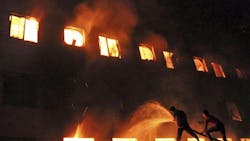Merkel Urges More Transparency in Clothing Production
BERLIN -- German Chancellor Angela Merkel on Friday urged greater transparency about where and how clothing is produced after the collapse of a garment factory complex in Bangladesh killed more than 500 people.
Merkel said she wanted to see a broadening out of the 'fair trade' label that already exists for some industries to the fashion sector, speaking at a German Protestant Church conference.
She said this could mirror efforts to establish the origins of tropical woods and palm oil to affirm environmental sustainability, speaking at the gathering in the northern port city of Hamburg.
"Europe could be a trailblazer here and say we also want a statement of origin on how this clothing was made," Merkel said.
The April 24 collapse of an eight-story building in Bangladesh was the latest in a series of disasters to befall the country's $20 billion textile industry, which accounts for 80% of Bangladeshi exports.
Merkel acknowledged that developing countries often feared losing their competitive edge if they commit to environmental and labor protection standards.
"Developing countries are often not very ready, at least the state institutions with whom we speak, to consent to too many such conditions because they are afraid that their competitive advantage in having jobs will of course be lost," she said.
She also stressed the need to find the "right path" in preventing "scandalous" conditions, such as overcrowded factories, in talks with the countries, while avoiding preaching to them.
In discussions about working conditions, she warned that appearing "so dominant and know-it-all" could be counterproductive, and "then we won't be successful."
Around 3,000 garment workers were on shift at the time of the disaster in the Rana Plaza compound, in Savar, around 20 miles northwest of Dhaka.
Spain's Mango, Britain's low-cost Primark chain and the Italian label Benetton were among the retailers who have confirmed having products made at Rana Plaza where the typical worker took home less than $40 a month.
Copyright Agence France-Presse, 2013
About the Author
Agence France-Presse
Copyright Agence France-Presse, 2002-2025. AFP text, photos, graphics and logos shall not be reproduced, published, broadcast, rewritten for broadcast or publication or redistributed directly or indirectly in any medium. AFP shall not be held liable for any delays, inaccuracies, errors or omissions in any AFP content, or for any actions taken in consequence.
